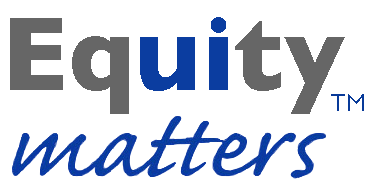What small, everyday practices help organizations walk the racial equity talk?
Our blog is a space to explore the hard questions that move organizations toward real change. Grounded in the belief that racial equity must live in both culture and daily practice, we share stories, tools, and reflections that help bridge values with action. From internal leadership shifts to community-rooted strategies, we highlight the everyday work of building racial equity, one decision, one relationship, one breakthrough at a time.
September's blogging prompt comes from CiKeithia.
Grand statements and glossy equity plans might grab headlines, but real change is built in the small, everyday choices we make. The way we run a meeting, share credit, check assumptions, or interrupt harm, all of it adds up to whether an organization is truly walking the talk on racial equity. In a moment when many are retreating from their commitments, the daily practices matter more than ever.
The question is: What small steps can your team take today to keep equity alive in everyday life?
As a facilitator, I often start my sessions off by sharing more about my “why.” I believe this is an important starting place because racial equity is deeply personal work. I believe in the promise that this work brings. Leading for racial equity is an opportunity to build knowledge, examine systemic power, and co-create solutions with communities that yield equitable and just outcomes for all. In short, racial equity means we all win. I am invested in all communities, having not just what we need to live, but to thrive.
Racial equity isn’t a one-time effort. It’s an ongoing commitment to change practices and processes that perpetuate systemic inequities and to actively decolonize our work. The following suggestions are provided to help you make progress in addressing inequity. Organizations can integrate these practices into every aspect of business.
Conduct a power analysis of current practices/policy work.
Make a list of those who are closest to power and decision-making, and notice the racial and gender makeup of the group, and then share your findings.
Use the findings to create new models for shared power and decision-making. Often, efforts fail when those most impacted are not part of the process.
Identify ongoing opportunities to amplify marginalized voices, without tokenizing.
What staff groups provide feedback, who lead meetings, and who is invited to participate in work groups?
Work with staff to co-create collective learning spaces where we all experience value and visibility.
Examine policies for contracting and procurement.
Be intentional about supporting and working with BIPOC businesses
Training should be a line item in your annual budgets and reflect your racial equity organizational commitments.
Invest in ongoing training and development for all staff
Establish benchmarks and metrics to examine progress.
Racial equity is not an add-on; it is the work.
Too often, organizations lean on potlucks, diversity days, or glossy statements as proof of progress. But equity doesn’t live there.
It lives in daily practices:
Who speaks in the meeting.
Who carries invisible labor, and whether it’s acknowledged.
Whether microaggressions are interrupted in real time.
How transparent leaders are with decisions and power.
Equity shows up in habits, not headlines. It’s in whether colleagues of color can exhale at work—or whether they must carry armor every day.
Let’s stop mistaking symbolic gestures for justice. Walking the talk of racial equity means aligning our daily choices with the values we claim.
Because racial equity is not the extra work. It is the work.
We’ve all been there. A team says equity matters, but the everyday habits tell a different story. To bring this to life, here are two snapshots of a remote team’s workday: one where equity is just talk, and one where it is put into practice.
Typical Day - Walking Away from Racial Equity: You log into your team's Zoom meeting, and your team leader jumps straight into the agenda. Only a few team members speak, and everyone else remains muted, with most having their videos turned off. Leaders vaguely mention that we “value equity.” But decisions move fast to “respect time” and “follow process.” Emails and team chats are task-driven, with little or no mention of racial equity. Behind-the-scenes group texts are complaining about a problematic teammate or leader, with racial dynamics mentioned but not discussed in the whole group. The newest team member, a woman of color, is left to try to initiate building connections and relationships with team members on her own. The team finishes the day, but racial equity is missing in practice.
Equity-Integrated Day - Walking the Racial Equity Talk: You log into your team’s Zoom meeting, and the leader begins with a brief check-in, inviting everyone to contribute in chat or on video. Many team members keep cameras on to foster connection, and facilitators pause to ask, “Whose voices or perspectives are missing here?” Leaders not only name equity as a value but also slow down decisions to consider impacts on different roles and racial identities. Emails and team chats include not only tasks but also share resources and perspectives on potential racial equity impacts. Instead of side texts, concerns about team dynamics are raised through agreed-upon feedback channels, creating space to discuss racial dynamics openly. The newest team member, a woman of color, is paired with a peer buddy who checks in and helps connect her to the group. By the end of the day, the team hasn’t just completed work; they’ve practiced equity in their relationships and decisions.
Which version feels closer to your team’s day? The good news is that equity is not only about big initiatives. It is built, or eroded, through the small everyday choices we make together.
If our equity tools, blog posts, or shared resources have added value to your work, consider leaving a contribution. Your support powers this work and fuels the creation of more racial justice-focused tools.

